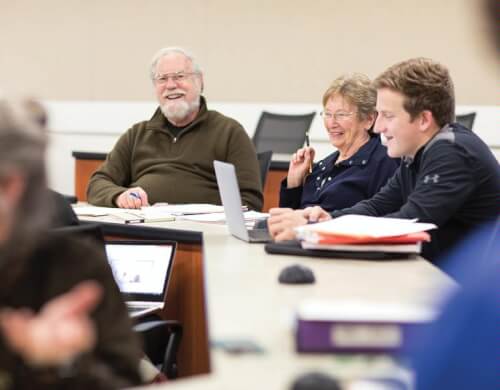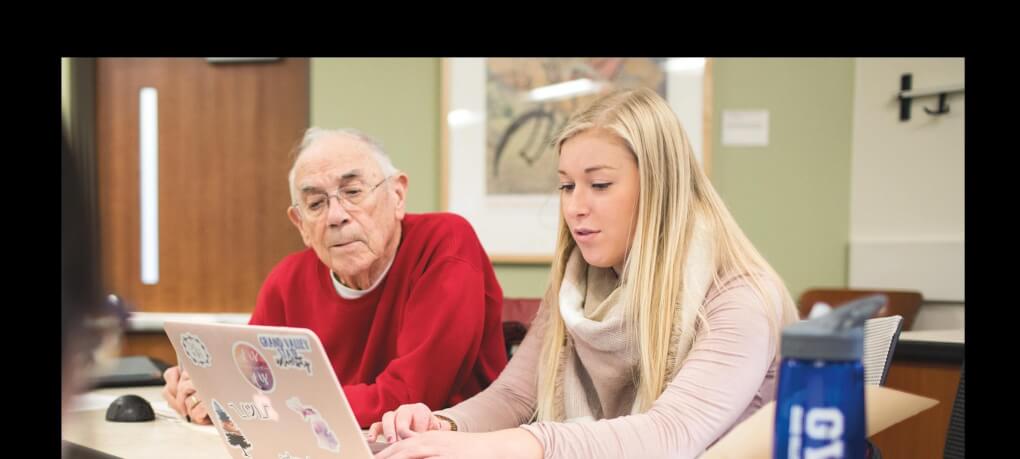Americans, as a whole, are getting older.
According to the U.S. Census Bureau, the number of adults in the country over age 65 will nearly double to 84 million people by 2050; this drastic increase will have far-reaching implications for families nationwide.
As the population ages, it has different needs, said Jane Toot, a Frederik Meijer Honors College professor. Toot is leading a unique class of students from different generations to find ways to improve the lives of the aged.
Her class has partnered with Porter Hills, a retirement community in Grand Rapids, to bring different generational viewpoints together to create a resource for the community.
“I realized being aged is like being a college student in some ways, picking where you want to spend parts of your life, and what you want to do with them. It's kind of a new beginning for both groups, and it's interesting to see the similarities.”
ELIZABETH MARTIN, HONORS STUDENT
Once a week, about 15 Porter Hills residents and other senior citizens come to campus to work with students in the honors college class and talk about the challenges of aging.
"When people get older they face a unique set of problems, but we're trying to show that a person doesn't become a problem," Toot said. "We focus on the 'saging process,' which is finding the wisdom-keepers of aging societies. Aged people can provide wisdom that younger people never think of."

Toot said gerontology focuses a bit narrowly on the medical side of things without considering problems related to non-medical issues. She hopes the class helps traditional college students look to the aged as a group to provide general guidance.
"They will share just about anything, and we've found that the degree of trust between the two groups is phenomenal," Toot said. "They're learning a lot about each other."
The end result of the partnership between the generations of students is a booklet Toot plans to distribute to West Michigan social service agencies and doctor's offices. "The GPS of Aging" will provide multi-generational advice on topics from transportation and mobility to nutrition, exercise, retirement, assistive technology and more.

Grand Valley student Robly Garcia said he and his peers have learned first-hand the issues older people have. "We talked about mobility and how important lighting is on stairs; none of us had really thought about that because we don't understand what challenges the older generation faces in situations like that," Garcia said.
Some of the older students said they wanted to get involved not only to share multi-generational wisdom, but because they will directly benefit from the material they're gathering.
"I'm all on board because of what I'll get out of it," said Jeanne Lucas. "I live in a house with my husband and don't deal with any of these aging issues yet, but the things we're working on in this book will end up helping me."
Communication is a theme that students from all generations said has been a big part of the learning experience. Robbie Dubisky said he doesn't see his grandparents very often, and does not have many occasions to talk to older people.
"This class helped me learn a lot about how to communicate with older people, and also reinforced that when it comes to dealing with these issues, they are not all that different from us," Dubisky said.
The intergenerational communication is a welcome change for the elders as well.
"The best thing about taking part in this class is being around some young people," said Stan Hone, a Porter Hills resident. "Where I live you're around all old people and it does affect you to a certain degree."
Other students said the class puts different generations on equal footing.
"For people our age, when you're around older people other than your grandparents, you're generally in a situation where you're not usually treated as equals and there's a bit more formality expected. But here, we're all students," Kelly McCormack said. "It's more of an even playing field and that lets us engage in a different kind of communication than we would normally have with anyone outside of family."

Toot said she will continue the class next fall and is working to establish intergenerational housing, in which several Grand Valley students would live at Porter Hills and engage with the residents. She also hopes to develop an interdisciplinary certificate program that would focus on studying aging.
She said the benefits of the ongoing study aren't solely for college students.
"I think it helps put some assumptions about elders to rest, and it helps enrich the elders, too," Toot said. "It lets them know that there's a lot we can learn from young people and that younger generations aren't going to hell in a handbasket."
Toot said that the country, in large part, is not prepared for the demographic influx of elders. She hopes this course and the exposure students get will help them develop respect for elders and the problems they face on a regular basis.
Elizabeth Martin said she and other college students realized the generations are more similar than they thought.
"I realized being aged is like being a college student in some ways, picking where you want to spend parts of your life, and what you want to do with them. It's kind of a new beginning for both groups, and it's interesting to see the similarities," Martin said.
Another benefit: some new friends.
"I've created a lot of really good relationships with some of the elders in the class, and I really value those," Martin said.







